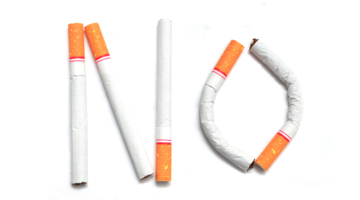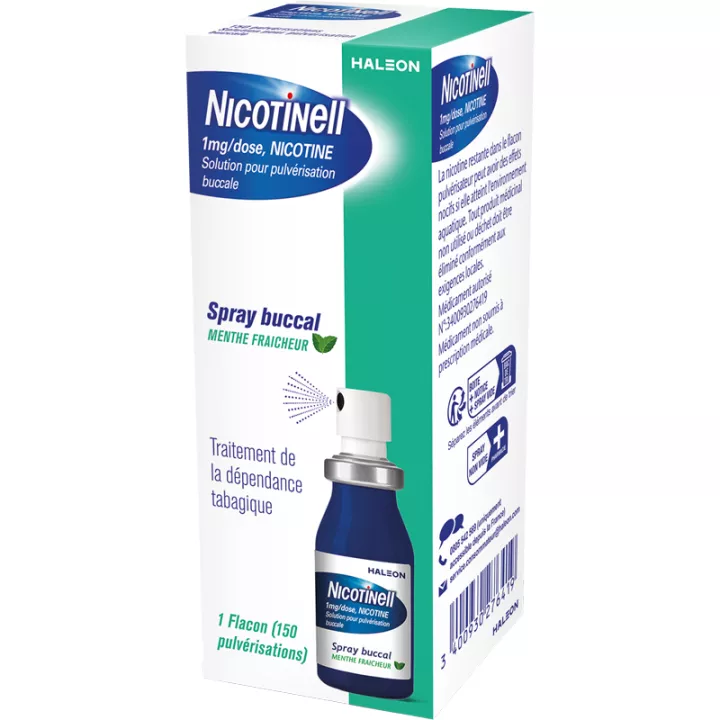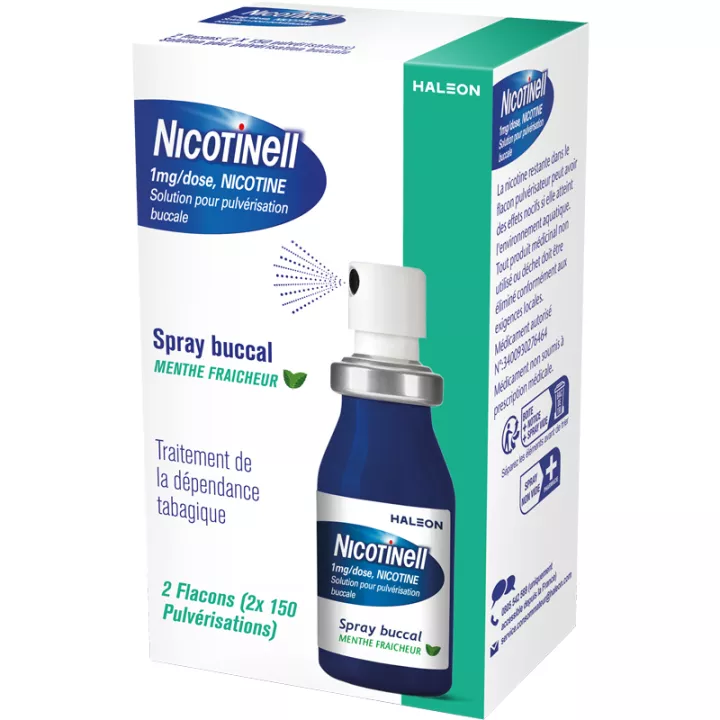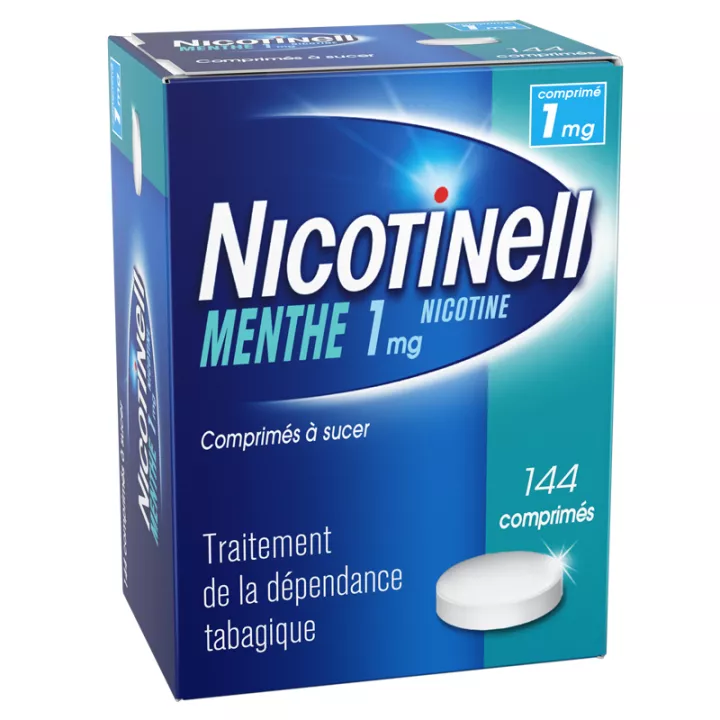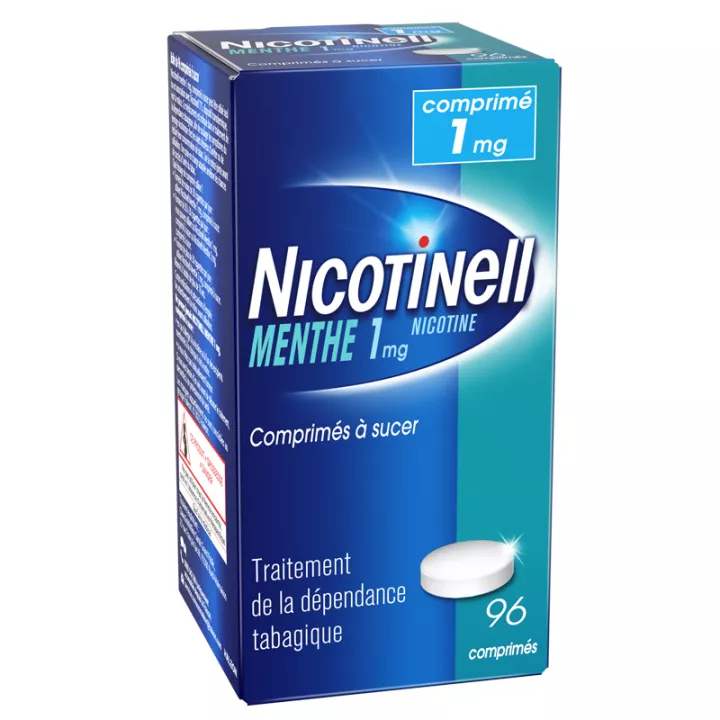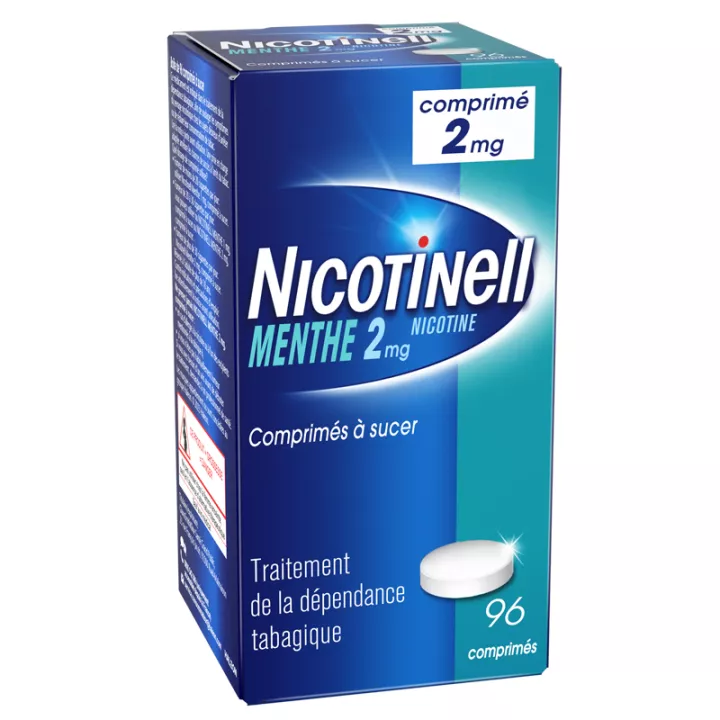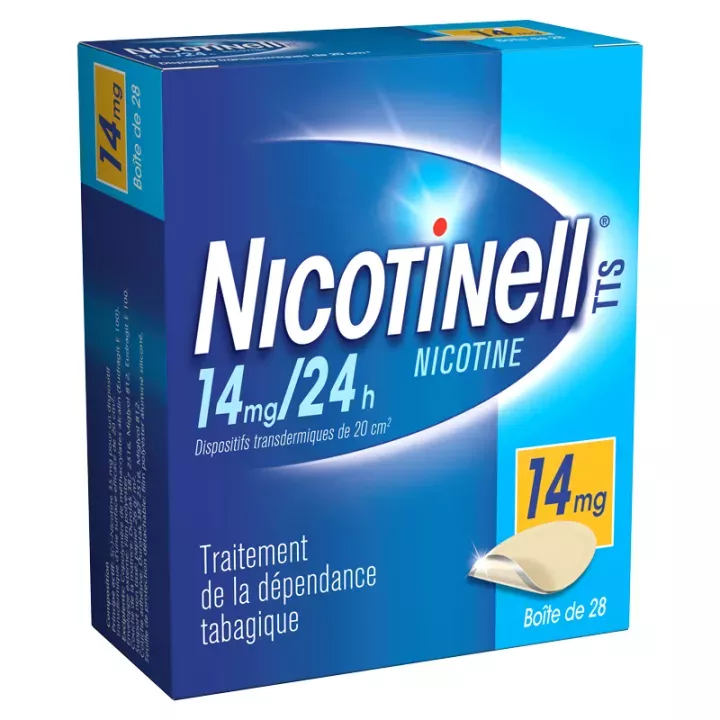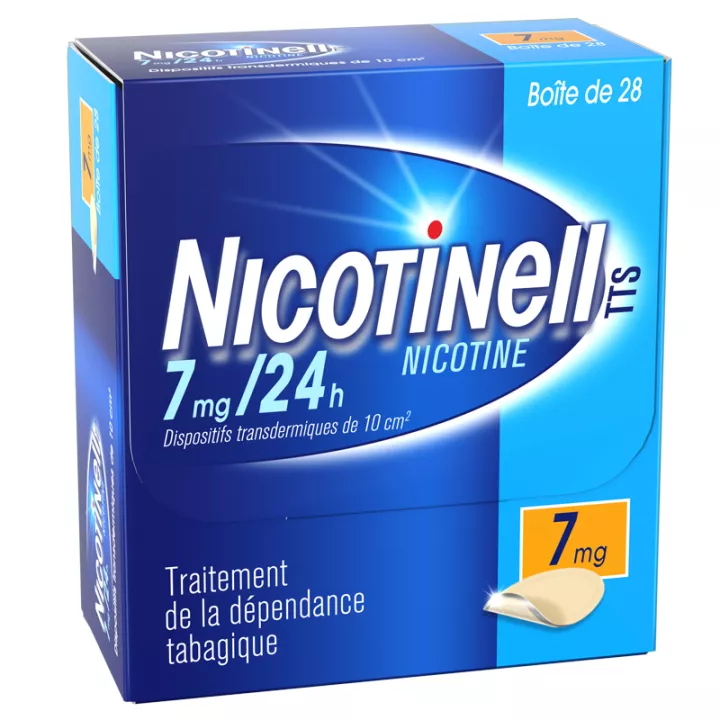NOTICE
ANSM - Updated on: 12/08/2016
Name of the medicinal product
NICOTINELL MENTHE 1 mg tablet to suck
Nicotine
framed
Read this leaflet carefully before you start taking this medicine. It contains important information for your treatment.
If you have any further questions, ask your doctor or pharmacist.
· Keep this leaflet, you may need to read it again.
· If you need more information and advice, ask your pharmacist.
· If you are still using NICOTINELL MENTHE 1 mg, tablet to suck after 9 months, consult a doctor.
· If you notice any side effects not listed in this leaflet, or if you experience any of the effects listed as serious, please tell your doctor or pharmacist.
Review summary
In this notice :
1. WHAT IS NICOTINELL MENTHE 1 mg, sucked tablet AND WHAT IT IS USED FOR?
2. BEFORE YOU TAKE NICOTINELL MENTHE 1 mg, tablet to suck?
3. HOW TO TAKE NICOTINELL MENTHE 1 mg, tablet to suck?
4. WHAT ARE POSSIBLE SIDE EFFECTS?
5. HOW TO STORE NICOTINELL MENTHE 1 mg, sucked tablet?
6. ADDITIONAL INFORMATION
1. WHAT IS NICOTINELL MENTHE 1 mg, sucked tablet AND WHAT IT IS USED FOR?
Pharmacotherapeutic group
NICOTINELL MENTHE 1 mg, sucking tablet contains nicotine, one of the tobacco substances.
NICOTINELL MENTHE 1 mg, sucked tablet belongs to the range of medications intended to help you to quit smoking.
Nicotine is released slowly and then absorbed through the oral mucosa whenever a tablet is sucked.
Therapeutic indications
This medicinal product is indicated in the aid for stopping smoking. The nicotine contained in NICOTINELL MENTHE 1 mg, sucked tablet, relieves the symptoms of nicotine withdrawal when you stop smoking or temporarily reduce, in order to facilitate total cessation. By relieving symptoms of withdrawal and irresistible cravings for smoking, NICOTINELL MENTHE 1 mg, a tablet to suck, prevents relapses in smokers motivated to quit.
Tailored management increases the chances of success when stopping smoking.
NICOTINELL is indicated for smokers aged over 18 years.
2. BEFORE YOU TAKE NICOTINELL MENTHE 1 mg, tablet to suck?
List of information needed before taking the medication
Not applicable.
Cons-indications
Never take NICOTINELL MENTHE 1 mg, tablet to suck:
· If you are not usually a smoker,
· In case of allergy to nicotine or to any of the excipients,
If in doubt, it is essential to seek the advice of your doctor or pharmacist.
Precautions for use; special warnings
Take special care with NICOTINELL MENTHE 1 mg, tablet to suck:
Consult your doctor or pharmacist if you:
· cardiovascular disease (myocardial infarction, heart failure, angina pectoris, Prinzmetal angina, heart rhythm disorder),
· history of stroke,
· high blood pressure,
· circulatory problems,
· diabetes,
· thyroid disease (hyperthyroidism),
· pheochromocytoma (disease of the adrenal glands causing severe hypertension),
· hepatic or renal insufficiency,
· inflammation of the mouth or throat, esophagitis, gastritis, ulcer of the stomach or duodenum.
Nicotine in small amounts is dangerous in children and can cause severe symptoms or death. This is why it is imperative to keep NICOTINELL MENTHE 1 mg, sucked tablet out of the reach and sight of children.
Children and adolescents under 18 years of age
This medication should not be used without medical advice in subjects younger than 18 years of age.
Interaction with other medicines
Other medicines and NICOTINELL MENTHE 1mg, sucked tablet:
Please tell your doctor or pharmacist if you are taking or have recently taken any other medicines, even medicines obtained without a prescription. If you stop smoking and are taking other medications, your doctor may want to adjust the dosage.
There are no data on possible interactions between NICOTINELL MENTHE 1 mg, tablet to suck and other medicines. However, substances in cigarettes, other than nicotine, may have an effect on certain drugs.
Stopping tobacco can affect the action of certain drugs, for example:
· theophylline (a drug used in the treatment of asthma),
· tacrine (a drug used in the treatment of Alzheimer's disease),
· olanzapine and clozapine (drugs used in the treatment of schizophrenia),
· doses of insulin (a drug used in the treatment of diabetes) may require dose adjustment.
Interactions with food and beverages
Not applicable.
Interactions with Herbal Medicines or Alternative Therapies
Not applicable.
Use during pregnancy and lactation
Pregnancy
It is very important to stop smoking during your pregnancy as this can lead to a delayed growth of your baby or even prematurity or fetal death. Ideally, you should try to stop smoking without taking medication. In case of failure, NICOTINELL MENTHE 1 mg, sucked tablet may be advised to help you. Indeed, the risk to the fetus is probably lower than that related to smoking. Nicotine in all its forms can harm your baby. NICOTINELL MENTHE 1 mg, sucked tablet can be taken only after consulting the doctor who is following your pregnancy or a doctor specializing in smoking cessation help.
feeding
NICOTINELL MENTHE 1 mg, tablet to be sucked as smoking, should be avoided during lactation because nicotine passes into breast milk.
If your doctor recommends the use of NICOTINELL MENTHE 1 mg tablet to suck during breastfeeding, the tablet should be sucked immediately after breastfeeding and not within two hours before the next breastfeeding.
Ask your doctor or pharmacist for advice before taking any medicine.
Sport
Not applicable.
Effects on ability to drive or use machines
Driving and using machines:
Stopping smoking can cause behavioral changes. At the recommended doses, there is no particular risk associated with NICOTINELL MENTHE 1 mg, tablet to suck.
List of excipients with known effect
Important information about some of the ingredients of NICOTINELL MENTHE 1 mg, sucked tablet:
The sucking tablet NICOTINELL MENTHE contains sweeteners, namely aspartame and maltitol.
Each tablet of NICOTINELL MENTHE 1 mg contains aspartame (E951) source of phenylalanine in an amount equivalent to 5 mg per tablet; which can be dangerous in subjects suffering from phenylketonuria.
NICOTINELL MENTHE 1 mg, sucking tablet contains maltitol (E965), source of fructose:
· if you know you are intolerant to certain sugars, consult your doctor before taking this medicine,
· a slight laxative effect is sometimes observed.
The caloric value of maltitol is 2.3 kcal / g. The constituents of NICOTINELL MENTHE 1 mg sucked tablet may be suitable for diabetics.
Each sucking tablet of NICOTINELL MENTHE 1 mg contains 9.8 mg of sodium, to be taken into account in people on a diet low in salt.
3. HOW TO TAKE NICOTINELL MENTHE 1 mg, tablet to suck?
Instructions for proper use
Use NICOTINELL MENTHE 1 mg, tablet to be sucked as indicated in the package leaflet. Ask your doctor or pharmacist for advice in case of doubt.
NICOTINELL MENTHE 1 mg tablets are available in 2 strengths (1 mg and 2 mg).
NICOTINELL MENTHE 1 mg, sucked tablet is recommended for smokers with low to moderately dependent nicotine. This medication is not recommended for smokers who are highly or highly dependent on nicotine.
NICOTINELL MENTHE 1 mg, sucked tablet can be used alone or in combination with NICOTINELL TTS, transdermal patch.
Adults over 18 years of age:
Treatment with NICOTINELL MENTHE 1 mg, tablet to suck.
The table below shows the dosage that is suitable for you:

If side effects occur with the use of 2 mg tablets, use 1 mg tablets.
Administration mode
ORAL WAY.
Do not swallow the tablet.
· Suck one tablet until the taste becomes strong.
· Then place the tablet between the gum and cheek.
· Repeat sucking the tablet when the taste has faded
· Continue this process until the tablet is completely dissolved (about 30 minutes)
Dosage, Mode and / or route (s) of administration, Frequency of administration and Duration of treatment
Dosage in adults over 18 years of age
Frequency of Administration
Suck one tablet every time you feel the need to smoke. The initial dose should be 1 tablet every 1 to 2 hours. The usual dose is 8 to 12 tablets per day. If you still feel an urge to smoke, you can take an extra tablet. The maximum dose is 30 tablets per day (this applies both to complete cessation and to reduction in tobacco consumption).
NICOTINELL MENTHE 1 mg tablet should be used as a priority for the complete cessation of smoking.
Duration of treatment
Complete cessation of smoking
At the beginning and throughout the treatment, complete cessation of tobacco is necessary to increase your chances of success.
The duration of the treatment must be adapted individually. Normally, treatment should be continued for at least 3 months. After this time, gradually reduce the number of tablets; stop treatment when the dose is reduced to 1-2 tablets per day. It is generally not recommended to continue treatment beyond 6 months. However, some "ex-smokers" may require longer treatment to avoid relapse.
If you have difficulty in stopping this medication for more than 9 months, seek medical advice.
Advice and follow-up can increase your chances of success.
Reduction in tobacco consumption
NICOTINELL MENTHE 1 mg tablet should be used between 2 cigarettes in order to prolong the periods without smoking and with the intention of reducing as much as possible the consumption of cigarettes. Cigarettes should be replaced as needed by NICOTINELL MENTHE 1 mg, tablet to be sucked.
If after six weeks you have not been able to reduce the number of cigarettes smoked per day to at least half, it is recommended to seek advice from a health care professional.
You should try to stop smoking as soon as you feel ready, but no more than 4 months after the initiation of the treatment. After this period, the number of tablets should be reduced gradually, for example by stopping a tablet every 2-5 days. If after more than 6 months after initiation of treatment, the attempt to stop smoking has failed, it is recommended to seek advice from a health professional. Regular use of NICOTINELL MENTHE 1 mg, tablet to suck, after 6 months is not generally recommended. Some former smokers may require longer treatment to avoid resuming smoking.
Counseling can improve your chances of stopping.
Treatment with NICOTINELL 1 mg, sucking tablet in combination with NICOTINELL TTS, transdermal patch
Complete cessation of smoking
If your treatment has failed with NICOTINELL 1 mg, sucked tablet alone, you can use it in combination with NICOTINELL TTS transdermal patch.
Note: Read the package insert of NICOTINELL TTS, a transdermal patch before use.
In order to increase your chances of quitting smoking, you should stop smoking completely when you start taking these suction pills in combination with NICOTINELL TTS, a transdermal patch, for the duration of the treatment.
The use of NICOTINELL TTS, a transdermal patch with NICOTINELL 1 mg, is recommended for smokers with moderate to severe nicotine use, ie more than 20 cigarettes per day. It is strongly recommended to carry out this therapy in association under the advice and support of a health professional.
Combination therapy should be used only when smoking cessation is complete.
Initial treatment in combination:
Begin treatment with a 21 mg / 24-hour patch in combination with NICOTINELL 1 mg, sucked tablet. Use at least 4 tablets to suck (1 mg) per day. In most cases, 5 to 6 tablets per day are sufficient. Do not use more than 15 tablets to suck a day. In normal situations, treatment should last no more than 6 to 12 weeks. Subsequently, you should reduce the nicotine dose gradually.
Apply the patch on clean, dry, undamaged skin where hair is rare (trunk, upper arms, hips) and press the patch on the skin with your hands for 10 to 20 seconds.
In order to minimize the risk of local irritation, it is advisable to apply NICOTINELL TTS, a transdermal patch, on a different application site from the previous site.
It is advisable to wash your hands thoroughly after handling the transdermal devices to avoid irritation of the eyes by nicotine deposited on the fingers.
Reduction of the nicotine dose after the initial 6 to 12 weeks:
This can be done in 2 ways.
Option 1: Use of the patches at a lower dose, ie NICOTINELL TTS 14 mg / 24 hours, transdermal patch for 3 to 6 weeks followed by NICOTINELL TTS 7 mg / 24 hours, transdermal patch for another 3 to 6 weeks with the initial dose of NICOTINELL 1 mg, sucked tablet. Thereafter, the number of tablets should be reduced gradually. It is generally not recommended to use NICOTINELL 1mg, tablet to suck for more than 6 months. However, some ex-smokers may require treatment for longer periods of time to avoid smoking, but this should not be longer than 9 months.
Option 2: Discontinuous use of patches and progressive decrease in the number of tablets in 1 mg. It is generally not recommended to use NICOTINELL 1 mg tablet to suck for more than 6 months. However, some ex-smokers may require treatment for longer periods of time to avoid smoking, but should not exceed 9 months.
Recommended Dosage
Period | Stamps | Tablet 1 mg |
Initial treatment (followed by option 1 or 2 below) |
First 6 to 12 weeks | 1 stamp 21 mg / 24 hours | When necessary, 5 to 6 tablets per day are recommended |
Reduction in Nicotine Dose - Option 1 |
First 3 to 6 weeks | 1 stamp 14 mg / 24 hours | Continue to use tablets when necessary. |
Next 3 to 6 weeks | 1 stamp 7 mg / 24 hours | Continue to use tablets when necessary. |
Up to 9 months in total | --- | Reduce the number of tablets gradually. |
Reduction of nicotine dose - option 2 |
Up to 9 months in total | --- | Continue to reduce the number of tablets gradually. |
If you continue to use the tablets to suck and the stamps after 9 months, it is advisable to consult a doctor or a pharmacist.
Symptoms and Instructions for Overdose
If you take more than NICOTINELL MENTHE 1 mg tablet to suck you should:
If you suck too many tablets you will feel the same signs as if you had smoked too much. These general signs of nicotine overdose are: general weakness, sweating, hypersalivation, throat irritation, nausea, vomiting, diarrhea, abdominal pain, hearing and vision disorders, headache, palpitations, shortness of breath and circulatory problems.
In this case, inform your pharmacist or doctor.
If you suspect poisoning in a child, contact a doctor or emergency department. Indeed, nicotine in small amounts is dangerous in children and can cause severe symptoms or death.
Instructions for omission of one or more doses
Not applicable.
Risk of withdrawal syndrome
Not applicable.
If you have any further questions on the use of this medication, ask your doctor or pharmacist.
4. WHAT ARE POSSIBLE SIDE EFFECTS?
Description of adverse reactions
Like all medicines, NICOTINELL MENTHE 1 mg, tablet to suck is likely to have unwanted effects, although not everyone is subject to it.
Some side effects such as dizziness, headaches and insomnia may occur at the start of treatment and may be due to symptoms of withdrawal associated with smoking cessation or nicotine underdosing.
Common side effects (affecting 1 to 10 people out of 100)
· Headache, dizziness.
· Dry mouth, hiccups, digestive upset, nausea, flatulence, heartburn, hypersalivation, irritation of the mouth and throat may occur, especially if you suck too fast the tablets.
These signs can be diminished by sucking the tablet more slowly.
Uncommon side effects (affecting 1 to 10 people in 1000)
· Palpitations.
Uncommon side effects (affecting 1 to 10 people out of 10,000)
· Heart rhythm disorders and allergic reactions. These reactions can be in very rare cases. You should consult your doctor immediately if you experience any symptoms such as swelling of the face, mouth and / or pharynx and / or difficulty swallowing or if you have an urticaria associated with difficulty breathing (edema of Quincke).
Mouth ulcers can occur when smoking cessation, but their relationship to nicotine therapy is not established.
Declaration of side effects
If you experience any side effects, talk to your doctor, pharmacist or nurse. This applies to any side effects not mentioned in this leaflet. You can also report adverse reactions directly via the national reporting system: National Agency for the Safety of Medicines and Health Products (ANSM) and network of Regional Centers of Pharmacovigilance - Website: www.ansm.sante.fr
By reporting adverse reactions, you are helping to provide more information about the safety of the drug.
5. HOW TO STORE NICOTINELL MENTHE 1 mg, sucked tablet?
Keep out of the reach and sight of children.
Expiration date
Do not use after the expiry date stated on the carton after "EXP".
The expiry date refers to the last day of the month.
Storage conditions
Store at a temperature not exceeding 25 ° C.
If necessary, warnings against visible signs of deterioration
Medicines should not be disposed of via wastewater or household waste. Ask your pharmacist what to do with unused medications. These measures will help protect the environment.
6. ADDITIONAL INFORMATION
Full list of active substances and excipients
What does NICOTINELL MENTHE 1 mg contain, sucked tablet?
The active substance is :
Nicotine ................................................. .................................................. ..................................... 1,000 mg
In the form of nicotine bitartrate dihydrate ........................................... ........................... 3,072 mg
For a tablet to suck.
The other components are :
Maltitol (E965), anhydrous sodium carbonate, sodium bicarbonate, 30% polyacrylate dispersion, xanthan gum, anhydrous colloidal silica, levomenthol, peppermint essential oil, aspartame (E951), magnesium stearate.
This medication does not contain sugar.
Pharmaceutical form and content
What is NICOTINELL MENTHE 1 mg, tablet to suck and contents of the pack?
NICOTINELL MENTHE 1 mg, sucked tablet is a white, mint-flavored, round and biconvex tablet.
NICOTINELL MINT, sucking tablet exists in two dosages (1 and 2 mg).
This medication is in the form of a tablet to be sucked in 12, 36, 72, 96, 144 or 204 tablets.
Name and address of the marketing authorization holder and the holder of the manufacturing authorization responsible for the release of the lots, if different
Holder
GLAXOSMITHKLINE HEALTH GRAND PUBLIC
100 ROUTE OF VERSAILLES
CS 80001
78164 MARLY-LE-ROI CEDEX
exploiting
GLAXOSMITHKLINE HEALTH GRAND PUBLIC
100 ROUTE OF VERSAILLES
CS 80001
78164 MARLY-LE-ROI CEDEX
Maker
NOVARTIS CONSUMER HEALTH GMBH
ZIELSTATTSTRASSE 40
81379 MUNICH
GERMANY
Names of the medicinal product in the Member States of the European Economic Area
This medicinal product is authorized in the Member States of the European Economic Area under the following names:
[to be completed by the holder]
Date of approval of the notice
The last date on which this notice was reserved is [MM / YYYY].
AMM under exceptional circumstances
Not applicable.
Internet Information
Detailed information on this medicine is available on the Ansm website (France).
Information for health professionals only
Not applicable.
Other
COUNCIL / HEALTH EDUCATION
As soon as you stop smoking:
· You will not absorb the irritating and toxic substances of cigarettes,
· You will see some improvements: progressive disappearance of headaches, cough, irritation of the throat, shortness of breath,
· You will often have the satisfaction of regaining better sleep, food flavor, odor and improve your physical performance,
· You will decrease your risk of developing lung cancer or cardiovascular disease.
It's never too late to quit even if you've smoked a long time and a lot. |
What is tobacco dependence?
Tobacco addiction is twofold:
· Psychological dependence:
Smoking a cigarette involves a ritual of automatic and repetitive gestures associated with particular circumstances (pleasure, response to stress, intellectual stimulation, support for morale, need for a gesture of conviviality). This is psychological and behavioral dependence.
· Physical dependence:
The need for the nicotine body is due to the effects of this substance on the nervous system. This is physical dependence. Failure to satisfy this need results in a sense of lack (see description in the chapter "How to overcome your physical dependence?").
Nicotinic substitutes aim to treat this dependence.
How to overcome your psychological addiction?
· Stopping smoking is necessary to increase your chances of success, but more:
o Choose a J day in the period that you think is the most favorable.
o Throw away your last pack of cigarettes, your lighter and put away your ashtrays.
o In a couple of smokers, it is preferable that the attempt to stop is made at the same time by both spouses.
· Tell your family and co-workers that you quit smoking. Ask them to respect your decision (no smoking near you, no longer offering you cigarettes).
· Prepare yourself to cope with the desire to smoke. It may occur suddenly and severely, especially during the first few weeks after the cessation of smoking, but does not last more than 3 or 4 minutes.
You have to anticipate what you will do in this case and act very quickly so as not to "crack" as for example:
o drink a large glass of water,
o to chew gum,
o counting up to 100,
o do some deep breaths,
o out of the room,
o change activity ...
· Avoid situations associated with taking cigarettes (coffee, aperitif, ...), avoid temptations (settle with non-smokers).
Find cigarette compensation (leisure, sport, cultural activity ...).
How to overcome your physical addiction?
If you are addicted to nicotine, the success of your approach may require the use of nicotine substitutes.
In order to assess your level of dependence, the Fagerström test is offered.
FAGERSTROM TEST
How long after you wake up do you smoke your first cigarette? · within 5 minutes: 3 · from 6 to 30 minutes: 2 · from 31 to 60 minutes: 1 · after 60 minutes: 0 | | |
Do you find it difficult to not smoke in places where it is forbidden? · yes: 1 · no: 0 | | |
What cigarette of the day would it be the most difficult for you to give up? · the first: 1 · another: 0 | | |
How many cigarettes do you smoke per day? · 10 or less: 0 · 11 to 20: 1 · 21 to 30: 2 · 31 or more: 3 | | |
Do you smoke at a more sustained pace in the morning than in the afternoon? · yes: 1 · no: 0 | | |
Do you smoke when you are so sick that you have to stay in bed almost all day? · yes: 1 · no: 0 | | |
TOTAL POINTS | | |
· score 0 to 2 : you are not addicted to nicotine.
You can stop smoking without the need for nicotine replacement.
If you are concerned about this decision, consult your pharmacist or doctor.
· score 3 to 4 : you are weakly dependent on nicotine.
score 5 to 6 : you are moderately addicted to nicotine.
The use of nicotine substitutes will increase your chances of success.
Consult with your pharmacist or doctor to help you choose the treatment best suited to your situation.
· score 7 to 10 : you are strongly or very strongly dependent on nicotine.
The use of nicotine substitutes is recommended to help you overcome this addiction to nicotine. This treatment should be used in sufficient and appropriate dosage.
Consult with your pharmacist or doctor, possibly as part of a specialized smoking cessation counseling.
Weaning-related disorders may persist for a long time and the duration of treatment should be sufficient, usually one to three months.
If you feel despite the treatment, a persistent lack of feeling like especially:
o compelling need to smoke,
o irritability, sleep disturbances,
o agitation or impatience,
o difficulty of concentration,
Take the advice of your doctor or pharmacist as doses may need to be adjusted.
How do you get help?
· Support from health professionals
The support, advice and follow-up that your doctor or pharmacist can give you will be valuable during the first six months of your smoking cessation. You can also use a specialized smoking cessation counseling, especially if you have already failed.
· Psychological support
Stopping smoking requires a supportive family and social environment. If you are concerned that the difficulties are too great, psychological support or temporary treatment can help.
· Dietetics
In the months following tobacco cessation, you may find moderate weight gain.
If you have any concerns in this area, you can contact a health professional who will be able to advise you.
You started smoking again, why?
Consider this relapse as an accident of course, as a normal event that allows to learn: the relapse is not a failure.
Analyze the reasons why you took back the tobacco.
· Because of the physical dependence
This may have been poorly taken into account or reappeared after several months, occasionally, for example, by prolonged stays in smoky atmospheres.
· Because of excessive weight gain.
It may be necessary to change your diet somewhat before your next attempt to quit smoking.
· Because of a decline in motivation , because of a painful event or a difficult period, because of psychological difficulties appearing at the cessation of smoking (depression, anxiety ...), because of a situation very tempting. Understand the reason for this relapse to prevent it if possible during the next attempt.
In all cases, do not hesitate to ask for advice from a health professional or to use a specialized consultation to help with smoking cessation.
If you have started smoking again, do not get discouraged, experience shows that your chances of success increase after one or more attempts to quit. |
